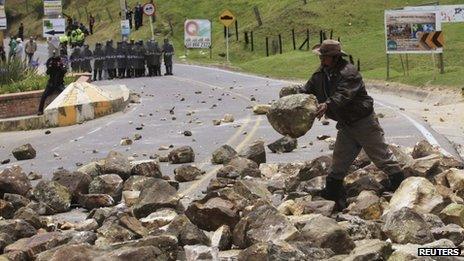Colombia agricultural strike sparks fear of shortages
- Published

Thousands of anti-riot police have been deployed across Colombia as protests by agricultural workers spread further.
Some 200,000 farmers have blocked dozens of roads, leaving the central province of Boyaca cut off.
The workers want the government to agree to a wide-ranging set of demands including subsidies for their products, and cheaper fuel prices.
The government says it will not negotiate until all roadblocks are lifted.
The strike entered its sixth day on Saturday, sparking fears that residents of the capital, Bogota, could face shortages of basic goods such as potatoes and milk.
Coffee and potato growers, dairy famers and lorry drivers have been staging protests in eleven of Colombia's 32 provinces.
Worst affected have been Boyaca and the southern province of Narino.
The main roads connecting Boyaca with neighbouring provinces have been blocked off by the protesters and local residents have reported a shortage of fuel.
Lessons were cancelled in most schools across the province and many shops remained closed.
'Just demands'
The protesters accuse the government of President Juan Manuel Santos of failing to put in place "concrete action to help the farming and agricultural sector".
Dairy farmers also complained about milk being smuggled into Colombia from neighbouring Venezuela and Ecuador and sold at lower prices, undercutting Colombian milk producers.
Interior Minister Fernando Carrillo wrote on Twitter that many of the demands "were just, but violent protests will not bring about solutions, but rather only deepen the crisis".
The head of the International Committee of the Red Cross in Colombia, Jordi Raich, called on the protesters to let ambulances and emergency workers through the barricades.
He said there had been 12 cases in which emergency workers had been hindered in their work.
The farmers say they need help from the government as the prices for raw materials and fuel needed to transport their goods rise, while the prices their products fetch have been falling.
The government says it will not sit down with the protesters until they lift the roadblocks.
- Published26 February 2013
- Published20 January 2011
- Published31 May 2011